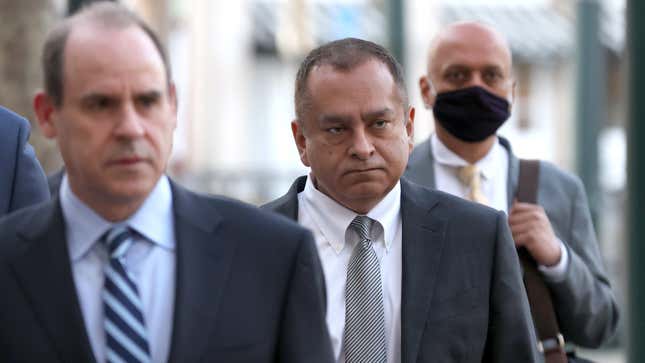
A dizzying two decades of the Theranos saga has come to a close.
After founder Elizabeth Holmes was sentenced to 11 years and three months in prison starting in April (after she gives birth to her second baby), only one loose end was left to be tied up—or locked up, rather. Sunny Balwani, Holmes’ ex-partner in business and romance, was sentenced yesterday (Dec. 8) to nearly 13 years.
According to the convictions, the two knowingly misled and defrauded investors, patients, and doctors about a supposedly promising at-home finger-prick blood testing kit. They overpromised the capabilities of the tech and made false statements about the company’s financial health.
But as one of Silicon Valley’s biggest scandals draws to a close, the two top execs who ran the company together are facing slightly different consequences. Balwani, who joined the now-defunct startup as the COO and president in 2009, is poised to spend more time in jail than the woman who started the project.
A sequel to the saga may be in the works as Holmes and Balwani intend to appeal the verdicts.
Comparing Balwani and Holmes’ convictions, by the digits
4: Charges for which Holmes was convicted in January. These included three counts of wire fraud and one count of conspiracy to commit wire fraud. She was acquitted on three counts of defrauding patients who bought tests from Theranos, and another related conspiracy charge
12: Charges for which Balwani was convicted in July. These included two counts of conspiracy and ten counts of wire fraud. He was held accountable for defrauding investors and patients both. “He made decisions that directly impacted the information that was communicated to patients, Jeffrey Schenk, assistant US attorney and lead prosecutor, said in court on Dec. 7.
3: Years of supervised release Holmes and Balwani have to honor after getting out of jail
20: Maximum sentence faced by both Holmes and Balwani
Holmes vs. Balwani, behind-the-scenes
Holmes and Balwani did not officially testify against each other. But they did come up a lot in each other’s trials. Throughout, Balwani’s lawyers reiterated that she was the “face” of the bogus startup, and he was a genuine believer in her project. And hers tried to paint him as the older, manipulative one shepherding a doe-eyed young entrepreneur.
In 2017, Holmes had assumed the role of the leader, telling the Securities and Exchanges Commission (SEC), “I’m the CEO. I’m the ultimate decision maker for the company.” But during the course of the trial, that stance changed, with her lawyers eventually urging judges to “examine Ms. Holmes the human being,” reminding the world that the now 37-year-old started Theranos as “teenager who had four quarters of college and some laboratory research experience under her belt but no business or management experience.”
Then, Holmes’ attorneys put forward a line of defense that tried to absolve her of some of the blame, citing Balwani’s controlling nature. In November 2021, Holmes took the stand to deliver a moving testimony about suffering emotional and sexual abuse at the hands of Balwani. Under the garb of grooming her into a successful leader, the much-older Balwani apparently called the shots on what she did, who she spent time with, and what she ate.
Balwani denied the allegations and the information was not permitted as evidence in his case. Balwani did not testify in his defense during his trial.
These allegations may have been damaging especially because, according to Michael Weinstein, a former federal prosecutor who leads white-collar litigation at the law firm Cole Schotz, Balwani might have been perceived as someone “a little bit older and wiser” who should’ve known better.
Balwani’s lawyers think his sentencing is unfair
While prosecutors asked for 15 years in prison, Balwani’s lawyers were trying to bring it down to a mere few months.
For one, they thought Balwani had suffered monetarily by investing and losing $5 million of his own in the startup—financial damage that Holmes didn’t incur. However, Holmes, who started the company at 19, saw her net wealth rise to $4.5 billion at peak success and plummet to zero after the legal troubles. Balwani didn’t amass as much wealth as her, but he did manage to retain far more. His net worth is still around $85 million.
Another argument the lawyers made was that, in contrast to the Theranos’ girlboss who went on to become a pop culture icon with her Steve Job-esque uniform, Balwani “never sought fame or recognition” and he has a “long history” of being quietly charitable. But then again, exhibitionism, or lack thereof, doesn’t matter in the court of law.
Related stories
🦾 The Theranos saga is coming to a close, but the tech founder’s myth lives on
📺 The Theranos trial was a pop culture phenomenon
💭 How Safeway and Walgreens fell for the Theranos pipe dream